高中英语名词性从句知识点及练习
- 格式:doc
- 大小:164.00 KB
- 文档页数:17
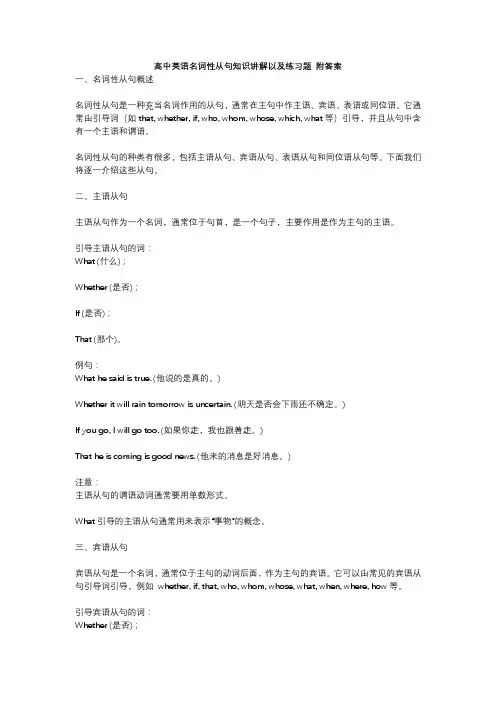
高中英语名词性从句知识讲解以及练习题附答案一、名词性从句概述名词性从句是一种充当名词作用的从句,通常在主句中作主语、宾语、表语或同位语。
它通常由引导词(如that, whether, if, who, whom, whose, which, what等)引导,并且从句中含有一个主语和谓语。
名词性从句的种类有很多,包括主语从句、宾语从句、表语从句和同位语从句等。
下面我们将逐一介绍这些从句。
二、主语从句主语从句作为一个名词,通常位于句首,是一个句子,主要作用是作为主句的主语。
引导主语从句的词:What (什么);Whether (是否);If (是否);That (那个)。
例句:What he said is true. (他说的是真的。
)Whether it will rain tomorrow is uncertain. (明天是否会下雨还不确定。
)If you go, I will go too. (如果你走,我也跟着走。
)That he is coming is good news. (他来的消息是好消息。
)注意:主语从句的谓语动词通常要用单数形式。
What引导的主语从句通常用来表示“事物”的概念。
三、宾语从句宾语从句是一个名词,通常位于主句的动词后面,作为主句的宾语。
它可以由常见的宾语从句引导词引导,例如whether, if, that, who, whom, whose, what, when, where, how等。
引导宾语从句的词:Whether (是否);If (是否);That (那个);Who (谁);Whom (谁);Whose (谁的);What (什么);When (何时);Where (何处);How (如何)。
例句:I know that he is coming. (我知道他要来。
)I wonder if he is telling the truth. (我想知道他是否说了真话。
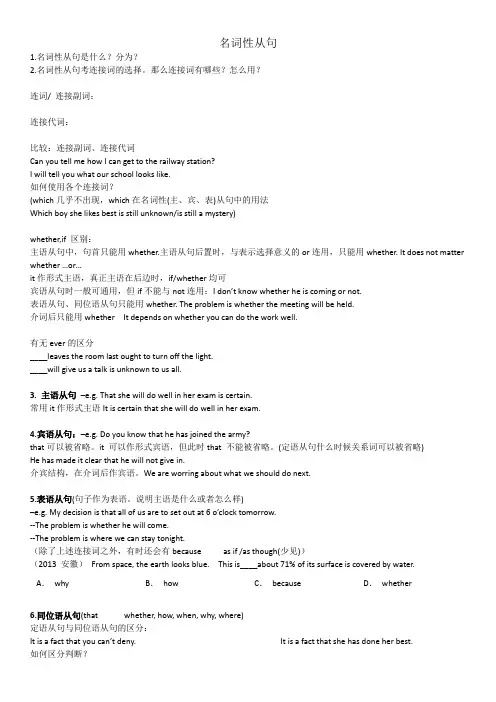
1.名词性从句是什么?分为?2.名词性从句考连接词的选择。
那么连接词有哪些?怎么用?连词/ 连接副词:连接代词:比较:连接副词、连接代词Can you tell me how I can get to the railway station?I will tell you what our school looks like.如何使用各个连接词?(which几乎不出现,which在名词性(主、宾、表)从句中的用法Which boy she likes best is still unknown/is still a mystery)whether,if 区别:主语从句中,句首只能用whether.主语从句后置时,与表示选择意义的or连用,只能用whether. It does not matter whether …or…it作形式主语,真正主语在后边时,if/whether均可宾语从句时一般可通用,但if不能与not连用:I don’t know whether he is coming or not.表语从句、同位语从句只能用whether. The problem is whether the meeting will be held.介词后只能用whether It depends on whether you can do the work well.有无ever的区分____leaves the room last ought to turn off the light.____will give us a talk is unknown to us all.3. 主语从句–e.g. That she will do well in her exam is certain.常用it作形式主语It is certain that she will do well in her exam.4.宾语从句:–e.g. Do you know that he has joined the army?that可以被省略。
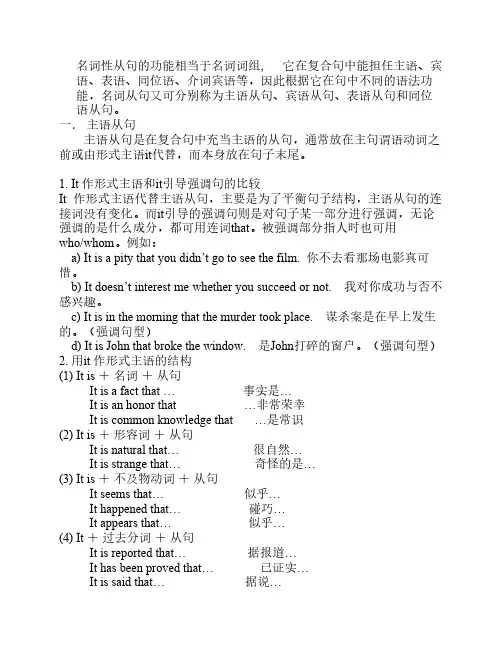
名词性从句的功能相当于名词词组, 它在复合句中能担任主语、宾语、表语、同位语、介词宾语等,因此根据它在句中不同的语法功能,名词从句又可分别称为主语从句、宾语从句、表语从句和同位语从句。
一.主语从句 主语从句是在复合句中充当主语的从句,通常放在主句谓语动词之前或由形式主语it代替,而本身放在句子末尾。
1. It 作形式主语和it引导强调句的比较It 作形式主语代替主语从句,主要是为了平衡句子结构,主语从句的连接词没有变化。
而it引导的强调句则是对句子某一部分进行强调,无论强调的是什么成分,都可用连词that。
被强调部分指人时也可用who/whom。
例如:a) It is a pity that you didn’t go to see the film. 你不去看那场电影真可惜。
b) It doesn’t interest me whether you succeed or not. 我对你成功与否不感兴趣。
c) It is in the morning that the murder took place. 谋杀案是在早上发生的。
(强调句型)d) It is John that broke the window. 是John打碎的窗户。
(强调句型)2. 用it 作形式主语的结构(1) It is +名词+从句It is a fact that … 事实是…It is an honor that …非常荣幸It is common knowledge that …是常识(2) It is +形容词+从句It is natural that… 很自然…It is strange that… 奇怪的是…(3) It is +不及物动词+从句It seems that… 似乎…It happened that… 碰巧…It appears that… 似乎…(4) It +过去分词+从句It is reported that… 据报道…It has been proved that… 已证实…It is said that… 据说…3. 主语从句不可位于句首的五种情况:(1)if 引导的主语从句不可居于复合句句首。
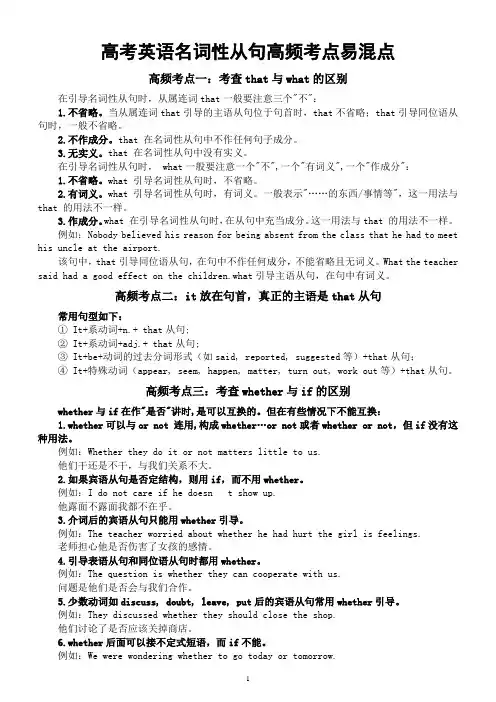
高考英语名词性从句高频考点易混点高频考点一:考查that与what的区别在引导名词性从句时,从属连词that一般要注意三个"不":1.不省略。
当从属连词that引导的主语从句位于句首时,that不省略;that引导同位语从句时,一般不省略。
2.不作成分。
that 在名词性从句中不作任何句子成分。
3.无实义。
that 在名词性从句中没有实义。
在引导名词性从句时, what一般要注意一个"不",一个"有词义",一个"作成分":1.不省略。
what 引导名词性从句时,不省略。
2.有词义。
what 引导名词性从句时,有词义。
一般表示"……的东西/事情等",这一用法与that 的用法不一样。
3.作成分。
what 在引导名词性从句时,在从句中充当成分。
这一用法与that 的用法不一样。
例如:Nobody believed his reason for being absent from the class that he had to meet his uncle at the airport.该句中,that引导同位语从句,在句中不作任何成分,不能省略且无词义。
What the teacher said had a good effect on the children.what引导主语从句,在句中有词义。
高频考点二:it放在句首,真正的主语是that从句常用句型如下:① It+系动词+n.+ that从句;② It+系动词+adj.+ that从句;③ It+be+动词的过去分词形式(如said, reported, suggested等)+that从句;④ It+特殊动词(appear, seem, happen, matter, turn out, work out等)+that从句。
高频考点三:考查whether与if的区别whether与if在作"是否"讲时,是可以互换的。
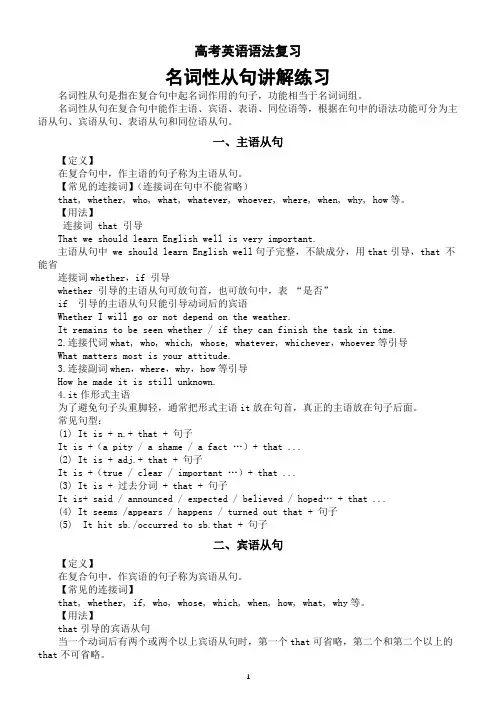
高考英语语法复习名词性从句讲解练习名词性从句是指在复合句中起名词作用的句子,功能相当于名词词组。
名词性从句在复合句中能作主语、宾语、表语、同位语等,根据在句中的语法功能可分为主语从句、宾语从句、表语从句和同位语从句。
一、主语从句【定义】在复合句中,作主语的句子称为主语从句。
【常见的连接词】(连接词在句中不能省略)that, whether, who, what, whatever, whoever, where, when, why, how等。
【用法】连接词 that 引导That we should learn English well is very important.主语从句中 we should learn English well句子完整,不缺成分,用that引导,that 不能省连接词whether,if 引导whether 引导的主语从句可放句首,也可放句中,表“是否”if 引导的主语从句只能引导动词后的宾语Whether I will go or not depend on the weather.It remains to be seen whether / if they can finish the task in time.2.连接代词what, who, which, whose, whatever, whichever,whoever等引导What matters most is your attitude.3.连接副词when,where,why,how等引导How he made it is still unknown.4.it作形式主语为了避免句子头重脚轻,通常把形式主语it放在句首,真正的主语放在句子后面。
常见句型:(1) It is + n.+ that + 句子It is +(a pity / a shame / a fact …)+ that ...(2) It is + adj.+ that + 句子It is +(true / clear / important …)+ that ...(3) It is + 过去分词 + that + 句子It is+ said / announced / expected / believed / hoped… + that ...(4) It seems /appears / happens / turned out that + 句子(5) It hit sb./occurred to sb.that + 句子二、宾语从句【定义】在复合句中,作宾语的句子称为宾语从句。
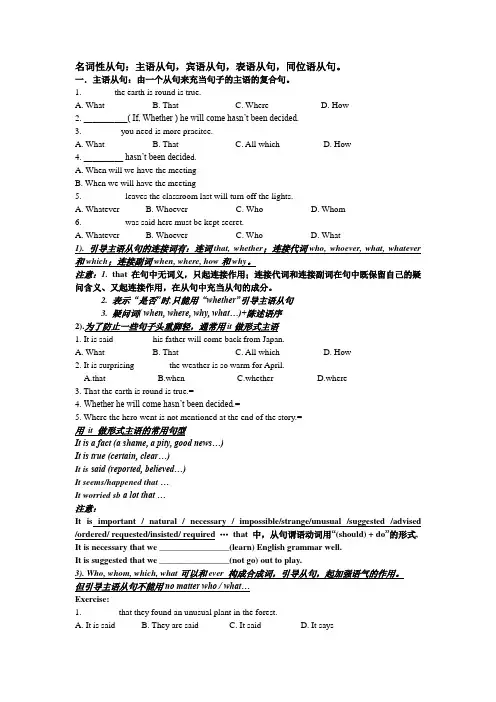
名词性从句:主语从句,宾语从句,表语从句,同位语从句。
一.主语从句:由一个从句来充当句子的主语的复合句。
1. _______the earth is round is true.A. WhatB. ThatC. WhereD. How2. __________( If, Whether ) he will come hasn’t been decided.3. ________ you need is more pracitce.A. WhatB. ThatC. All whichD. How4. _________ hasn’t been decide d.A. When will we have the meetingB. When we will have the meeting5. _________ leaves the classroom last will turn off the lights.A. WhateverB. WhoeverC. WhoD. Whom6. _________ was said here must be kept secret.A. WhateverB. WhoeverC. WhoD. What1). 引导主语从句的连接词有:连词that, whether;连接代词who, whoever, what, whatever 和which;连接副词when, where, how和why。
注意:1. that在句中无词义,只起连接作用;连接代词和连接副词在句中既保留自己的疑问含义、又起连接作用,在从句中充当从句的成分。
2. 表示“是否”时,只能用“whether”引导主语从句3. 疑问词( when, where, why, what…)+陈述语序2).为了防止一些句子头重脚轻,通常用it做形式主语1. It is said ________ his father will come back from Japan.A. WhatB. ThatC. All whichD. How2. It is surprising _______ the weather is so warm for April.A.thatB.whenC.whetherD.where3. That the earth is round is true.=4. Whether he will come hasn’t been decided.=5. Where the hero went is not mentioned at the end of the story.=用it 做形式主语的常用句型It is a fact (a shame, a pity, good news…)It is true (certain, clear…)It is said (reported, believed…)It seems/happened that …It worried sb a lot that …注意:It is important / natural / necessary / impossible/strange/unusual /suggested /advised /ordered/ requested/insisted/ required …that 中,从句谓语动词用“(should) + do”的形式, It is necessary that we ________________(learn) English grammar well.It is suggested that we ________________(not go) out to play.3). Who, whom, which, what可以和ever 构成合成词,引导从句,起加强语气的作用。
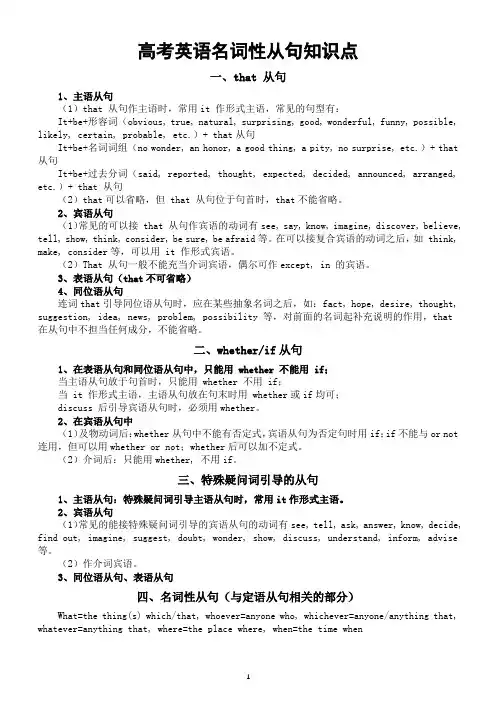
高考英语名词性从句知识点一、that 从句1、主语从句(1)that 从句作主语时,常用it 作形式主语,常见的句型有:It+be+形容词(obvious, true, natural, surprising, good, wonderful, funny, possible, likely, certain, probable, etc.)+ that从句It+be+名词词组(no wonder, an honor, a good thing, a pity, no surprise, etc.)+ that 从句It+be+过去分词(said, reported, thought, expected, decided, announced, arranged, etc.)+ that 从句(2)that可以省略,但 that 从句位于句首时,that不能省略。
2、宾语从句(1)常见的可以接 that 从句作宾语的动词有see, say, know, imagine, discover, believe, tell, show, think, consider, be sure, be afraid等。
在可以接复合宾语的动词之后,如 think, make, consider等,可以用 it 作形式宾语。
(2)That 从句一般不能充当介词宾语,偶尔可作except, in 的宾语。
3、表语从句(that不可省略)4、同位语从句连词that引导同位语从句时,应在某些抽象名词之后,如:fact, hope, desire, thought, suggestion, idea, news, problem, possibility 等,对前面的名词起补充说明的作用,that在从句中不担当任何成分,不能省略。
二、whether/if从句1、在表语从句和同位语从句中,只能用 whether 不能用 if;当主语从句放于句首时,只能用 whether 不用 if;当 it 作形式主语,主语从句放在句末时用 whether或if均可;discuss 后引导宾语从句时,必须用whether。
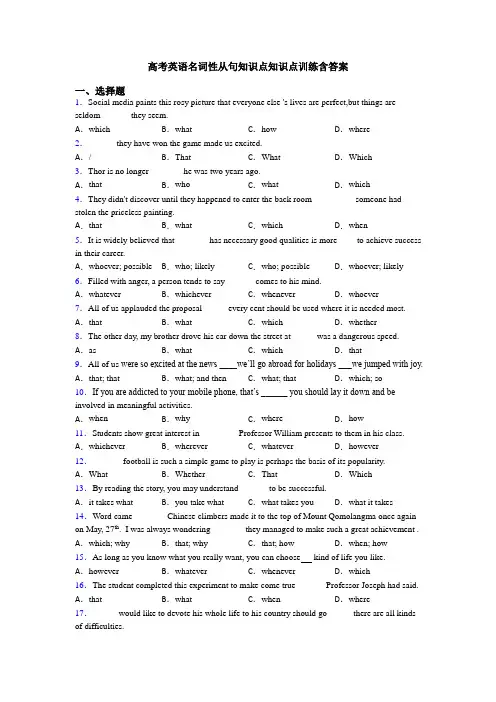
高考英语名词性从句知识点知识点训练含答案一、选择题1.Social media paints this rosy picture that everyone else 's lives are perfect,but things are seldom_______they seem.A.which B.what C.how D.where2.______ they have won the game made us excited.A./B.That C.What D.Which3.Thor is no longer _______ he was two years ago.A.that B.who C.what D.which4.They didn't discover until they happened to enter the back room _________ someone had stolen the priceless painting.A.that B.what C.which D.when5.It is widely believed that _______ has necessary good qualities is more____ to achieve success in their career.A.whoever; possible B.who; likely C.who; possible D.whoever; likely 6.Filled with anger, a person tends to say ______ comes to his mind.A.whatever B.whichever C.whenever D.whoever7.All of us applauded the proposal _____ every cent should be used where it is needed most. A.that B.what C.which D.whether8.The other day, my brother drove his car down the street at _____ was a dangerous speed. A.as B.what C.which D.that9.All of us were so excited at the news ____we’ll go abroad for holidays ___we jumped with joy. A.that; that B.what; and then C.what; that D.which; so10.If you are addicted to your mobile phone, that’s ______ you should lay it down and be involved in meaningful activities.A.when B.why C.where D.how 11.Students show great interest in ________ Professor William presents to them in his class. A.whichever B.wherever C.whatever D.however12._______football is such a simple game to play is perhaps the basis of its popularity. A.What B.Whether C.That D.Which13.By reading the story, you may understand ______ to be successful.A.it takes what B.you take what C.what takes you D.what it takes 14.Word came _______ Chinese climbers made it to the top of Mount Qomolangma once again on May, 27th. I was always wondering _______ they managed to make such a great achievement . A.which; why B.that; why C.that; how D.when; how15.As long as you know what you really want, you can choose kind of life you like. A.however B.whatever C.whenever D.which16.The student completed this experiment to make come true ______ Professor Joseph had said. A.that B.what C.when D.where17.______would like to devote his whole life to his country should go______there are all kinds of difficulties.A.Who;some B.Whoever;whereC.Whatever; anywhere D.Who;there18.—What’s your understanding of success,Robert?—In my view,success is________preparation and chances meet.A.how B.why C.what D.where19.It was__ he said__ disappointed me.A.that;what B.what;that C.what;what D.that;that 20.The whole nation responds to the call _______ everybody shall wear masks wherever they go. A.which B.that C.when D.because21.The companies are working together to create ________ they hope will be the best means of transport in the 21st century.A.which B.that C.what D.who22.The reason ________ he didn’t come to school on time is ________ he had to take care of his sick brother at home.A.That; because B.that; that C.why; because D.why; that 23.(2016·天津)The manager put forward a suggestion __________ we should have an assistant. There is too much work to do.A.whether B.thatC.which D.what24.A saying goes_____ all work and no play___________ Jack a dull boy.A.that; makes B.which; makes C.that; make D.which; make 25.— Would you please tell us the prospect of fighting against COVID-19?—We are sure to win the battle, but ______ it’ll be over soon I’m not sure at the moment. A.whether B.that C.if D.when【参考答案】***试卷处理标记,请不要删除一、选择题1.B解析:B【解析】【分析】【详解】考察名词性从句,句意:社交媒体营造了一种美好的假象,那就是每个人的生活看上去都很完美,但事实上事情很少是表面上所看到的那样。
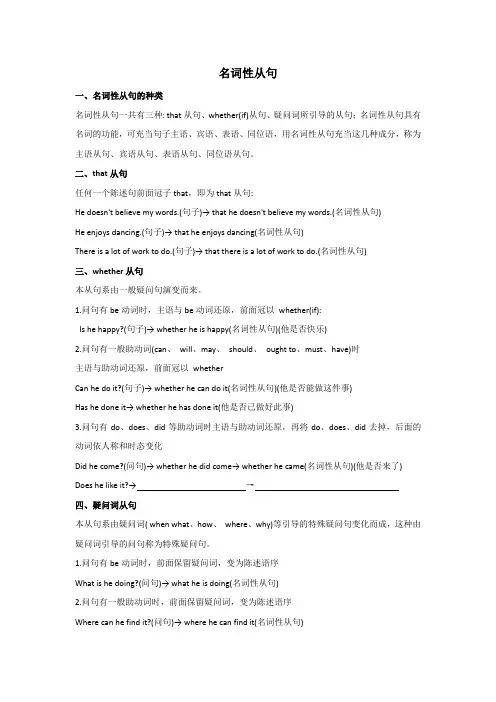
名词性从句一、名词性从句的种类名词性从句一共有三种: that从句、whether(if)从句、疑问词所引导的从句;名词性从句具有名词的功能,可充当句子主语、宾语、表语、同位语,用名词性从句充当这几种成分,称为主语从句、宾语从句、表语从句、同位语从句。
二、that从句任何一个陈述句前面冠子that,即为that从句:He doesn't believe my words.(句子)→ that he doesn't believe my words.(名词性从句)He enjoys dancing.(句子)→ that he enjoys dancing(名词性从句)There is a lot of work to do.(句子)→ that there is a lot of work to do.(名词性从句)三、whether从句本从句系由一般疑问句演变而来。
1.问句有be动词时,主语与be动词还原,前面冠以whether(if):Is he happy?(句子)→ whether he is happy(名词性从句)(他是否快乐)2.问句有一般助动词(can、will、may、should、ought to、must、have)时主语与助动词还原,前面冠以whetherCan he do it?(句子)→ whether he can do it(名词性从句)(他是否能做这件事)Has he done it→ whether he has done it(他是否已做好此事)3.问句有do、does、did等助动词时主语与助动词还原,再将do、does、did去掉,后面的动词依人称和时态变化Did he come?(问句)→ whether he did come→ whether he came(名词性从句)(他是否来了) Does he like it?→→四、疑问词从句本从句系由疑问词( when what、how、where、why)等引导的特殊疑问句变化而成,这种由疑问词引导的问句称为特殊疑问句。
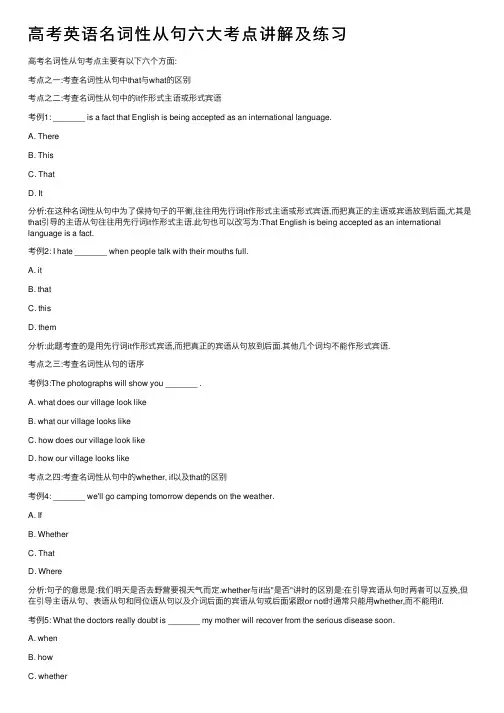
⾼考英语名词性从句六⼤考点讲解及练习⾼考名词性从句考点主要有以下六个⽅⾯:考点之⼀:考查名词性从句中that与what的区别考点之⼆:考查名词性从句中的it作形式主语或形式宾语考例1: _______ is a fact that English is being accepted as an international language.A. ThereB. ThisC. ThatD. It分析:在这种名词性从句中为了保持句⼦的平衡,往往⽤先⾏词it作形式主语或形式宾语,⽽把真正的主语或宾语放到后⾯,尤其是that引导的主语从句往往⽤先⾏词it作形式主语.此句也可以改写为:That English is being accepted as an international language is a fact.考例2: I hate _______ when people talk with their mouths full.A. itB. thatC. thisD. them分析:此题考查的是⽤先⾏词it作形式宾语,⽽把真正的宾语从句放到后⾯.其他⼏个词均不能作形式宾语.考点之三:考查名词性从句的语序考例3:The photographs will show you _______ .A. what does our village look likeB. what our village looks likeC. how does our village look likeD. how our village looks like考点之四:考查名词性从句中的whether, if以及that的区别考例4: _______ we'll go camping tomorrow depends on the weather.A. IfB. WhetherC. ThatD. Where分析:句⼦的意思是:我们明天是否去野营要视天⽓⽽定.whether与if当"是否"讲时的区别是:在引导宾语从句时两者可以互换,但在引导主语从句、表语从句和同位语从句以及介词后⾯的宾语从句或后⾯紧跟or not时通常只能⽤whether,⽽不能⽤if.考例5: What the doctors really doubt is _______ my mother will recover from the serious disease soon.A. whenB. howD. why分析:本题句⼦的意思是:医⽣真正怀疑的是我母亲是否能很快从重病中恢复过来.whethe r引导的是表语从句.It worried her a bit _______ her hair was turning gray.A. whileB. thatC. ifD. for考点之五:考查名词性从句中的疑问词+ever引导的名词性从句及其与no matter+疑问词引导的从句的区别考例6 :It is generally considered unwise to give a child _______ he or she wants.A. howeverB. whateverC. whicheverD. whenever分析:本题句⼦的意思是:⼀般认为孩⼦要什么就给什么是不明智的.whatever引导的是宾语从句,A. however 和D. whenever是不能作宾语的;⽽C. whichever表⽰"⽆论哪⼀个、⽆论哪些",表⽰在⼀定范围内的⼈或事物,此处并不涉及"⼀定范围内的⼈或事物",所以也不能选.考例7: Sarah hopes to become a friend of ______ shares her interests.A. anyoneB. whomeverC. whoeverD. no matter who分析:本题句⼦的意思是:萨拉希望跟⾃⼰有共同爱好的⼈交朋友.疑问词+ever引导的名词性从句与no matter+疑问词引导的从句的区别是:前者既可以引导名词性从句也可以引导让步状语从句;后者只能引导让步状语从句.⾸先排除D.⽽选A. anyone则应在其后加who.从句中需要的是主语,所以whomever也不⾏.考点之六:考查名词性从句的虚拟语⽓问题考例8 :It is necessary that a college student ______ at least a foreign language.A. mastersB. should masterC. masteredD. will master分析:句⼦的意思是:⼤学⽣⾄少应该掌握⼀门外语。
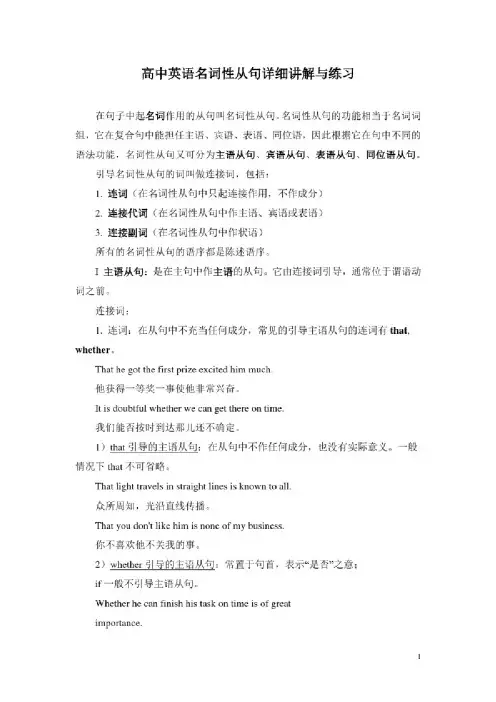
高中英语名词性从句详细讲解与练习在句子中起名词作用的从句叫名词性从句。
名词性从句的功能相当于名词词组,它在复合句中能担任主语、宾语、表语、同位语,因此根据它在句中不同的语法功能,名词性从句又可分为主语从句、宾语从句、表语从句、同位语从句。
引导名词性从句的词叫做连接词,包括:1.连词(在名词性从句中只起连接作用,不作成分)2.连接代词(在名词性从句中作主语、宾语或表语)3.连接副词(在名词性从句中作状语)所有的名词性从句的语序都是陈述语序。
I主语从句:是在主句中作主语的从句。
它由连接词引导,通常位于谓语动词之前。
连接词:1.连词:在从句中不充当任何成分,常见的引导主语从句的连词有that, whether oThat he got the first prize excited him much.他获得一等奖一事使他非常兴奋。
It is doubtful whether we can get there on time.我们能否按时到达那儿还不确定。
D that引导的主语从句:在从句中不作任何成分,也没有实际意义。
一般情况下that不可省略。
That light travels in straight lines is known to all.众所周知,光沿直线传播。
That you don't like him is none of my business.你不喜欢他不关我的事。
2)whether引导的土语从句:常置于句首,表示“是否”之意;if一般不引导主语从句。
Whether he can finish his task on time is of greatimportance.他是否能按时完成任务非常重要。
Whether you can succeed or not depends on howhard you work at it.你能否成功取决于你努力的程度。
2.连接代词:在从句中起名词或代词的作用,常作从句的主语、宾语、表语或定语,有具体意义且不能省略。
专题三名词性从句名词性从句指在复合句中起名词作用的从句,它在句子中可作主语、宾语、表语或同位语。
名词性从句既是中学英语教课的要点,也是高考考察的热门。
一、名词性从句的分类名词性从句包含主语从句、宾语从句、表语从句和同位语从句。
其连结词有 that, if, whether;连结代词 who, what, which;连结副词 when, where, how, why 等。
考察热门一:对主语从句的考察主语从句在复合句中充任主语,它能够放在主句谓语动词以前。
但为了保持句子均衡,多半状况下可用it 作形式主语,而把主语从句置于句尾。
考察热门二:对宾语从句的考察宾语从句在句子中作及物动词或介词的宾语。
假如主句的谓语动词是及物动 make, find, see, think 等,则把宾语从句置于宾语补足语以后,用it 作形式宾语。
此外,某些作表语的形容词,如 sure, happy, glad, certain 等以后也能够带宾语从句。
考察热门三:对表语从句的考察表语从句在句子中作表语,位于主句中的系动词以后。
考察热门四:对同位语从句的考察同位语从句一般跟在某些抽象名词以后,进一步说明该名词所表示的详细内容。
可跟同位语从句的名词主要有:fact, idea, news, promise, belief, condition, doubt, fear, hope, problem, proof, question, reply, report, suggestion, thought, truth等。
二、对名词性从句的考察应注意以下几点:考察热门五:考察名词性从句的语序和主从句时态名词性从句均应用陈说句语序,其时态要保持主从句时态一致性。
考察热门六:从语境和句子构造需要出发,选择适合的连词(I)连词that 和what:that 无实质意义,在从句中不充任任何成分,只起连结主从句的作用;如 that 指引宾语从句,常可省略;如指引主语从句、表语从句或同位语从句, that 不可以省略。
高中英语名词性从句知识点(含练习)基础回顾1.表语:表语用来说明主语的身份、性质、品性、特征和状态的,表语常由名词、形容词、副词、介词短语、动词的-ing、不定式、从句来充当,它常位于系动词(be, become, appear, seem,look,sound,feel,get,smell等词)之后。
如:Her job is selling computers. 此句表语为selling computers如果句子的表语也是由一个句子充当的,那么这个充当表语的句子就叫做表语从句。
2.同位语:一个名词(或其它形式)对另一个名词或代词进行解释或补充说明,这个名词(或其它形式)就是同位语。
如Mr. Smith,our new teacher,is very kind to us. 我们的新老师史密斯先生对我们很好。
Mr.Smith是主语our new teacher的同位语,指同一人。
同位语从句I heard the news that our team had won.我听到了我们队获胜的消息。
that our team had won 解释news的具体内容,是同位语正文一、定义在复合句中具有名词的性质的作主语、表语、同位语、宾语的从句叫名词性从句。
因此,我们把主语从句、表语从句、同位语从句和宾语从句这四种从句统称为名词性从句。
That he finished writing the composition in such a short time surprised us all他在很短的时间内写完作文让我们都很惊讶 (主语从句)The trouble is that she has lost his address. 麻烦的是她把他的地址搞丢了。
(表语从句)They have no idea at all where he has gone. 他们不知道他去什么地方了。
(同位语从句)Do you remember how he came? 你记得他怎么来的么?(宾语从句)二、语序名词性从句要采用陈述句语序。
高考名词性从句知识点总结及典型例题名词性从句名词性从句相当于名词,可分别作主句的主语、表语、宾语和同位语。
因此,名词性从句厅分为主语从句、表语从句、宾语从句和同位从句。
(一)引导名词性从句的连接词1、连接代词:who, whose, whom, what, which。
有词义,在从句中担任成分,如主语、表语、宾语、或定语等。
2、连接副词:when, where, why, how。
有词义,在从句中担任成分,作状语。
3、连接词:that, whether, if, as if。
that 无词义,在从句中不担任成分,有时可省略;if (whether), as if虽有词义,但在从句中不担任成分。
注意:1、连接代词与连接副词在句中不再是疑问句,因而从句中谓语不用疑问式。
连接代词与连接副词在从句充当句子成分,连接词whether 和if(是否),as if(好象)在从句中不充当句子成分,只起连接作用。
根据句义,如果连接代词与连接副词,whether、if 和as if 都用不上时,才用that作连接词(that本身无任何含义)。
2、不可省略的连词:(1)介词后的连词(2)引导主语从句和同位语从句的连词不可省略。
That she was chosen made us very happy.We heard the news that our team had won.(二)主语从句1、主语从句在复合句作主语。
e.g. Who will go is not important.2、用it作形式主语,主语从句放在句末。
e.g. It does n’t matter so much whether you will come or not.主要句型有:(1)It+be+形容词+that从句。
It is probable that he told her everything. 很可能他把一切都告诉她了。
(2)It+be+名词词组(no wonder, an honour, a good thing, a pity, no surprise, etc.)+that从句。
高中英语语法专攻-《名词性从句》【考点1-引导词】【考点2-主语从句】①定义:主语从句是指在复合句中充当主语的句子,它是名词的拓展,属于主语的第三个表达层次。
所以,主语从句和名词一样通常是出现在谓语动词的前面。
②主语从句的引导词:从属连词:that、whether、if(不可位于句首)连接代词:what, whatever/who, whoever/whom, whomever/whose,whosever/which,whichever连接副词:when, whenever/where,wherever/how, however/whythat引导主语从句(that无含义,在句中不作成分,不可省略)That youth is wholly experimental is known to us all。
众所周知,青春就是探索的岁月。
That she finished reading an English novel surprised us all.她读完了一部全英文小说让我们惊讶That you will win the medal seems unlikely.你赢得奖牌似乎是不可能的。
That he is still alive is a wonder.他还活着,真是奇迹。
That we shall be late is certain.我们要晚了,这是确定无疑的。
That she is still alive is a consolation.她还活着是使人感到宽慰的。
Whether引导主语从句(whether有含义“是否”,在句中不作成分,不可省)Whether she will come to the party makes no difference.她来不来参加聚会都没有关系。
It makes no difference whether/if she will come to the party.W hether he is coming or not doesn’t matter too much.他来或不来都不怎么重要It doesn’t matter too much whether he is coming or not.Who,whom, what, which,whose(连接代词)引导主语从句(连接代词有含义,在句中起名词性作用,担当一定成分)Who will be the leader of the team has not been decided yet.谁会成为这个队的领头人还没定下来。
名词性从句专项复习及练习(一)名词性从句的种类在句子中起名词作用的句子叫名词性从句。
名词从句的功能相当于名词词组, 它在复合句中能担任主语、宾语、介词宾语、表语、同位语等,因此根据它在句中不同的语法功能,名词从句又可分别称为主语从句、宾语从句、表语从句和同位语从句。
主语从句主语从句是在复合句中充当主语的从句That price will go up is certain. Whether we go by train or by boat makes no difference.What surprised us is that he lost in the game. When he will be back depends on the weather.Watever he did is right. Whoever comes will be welcome.名词性从句作主语也常用先行词it做形式主语,而将从句置于句末。
例如:It is not yet decided who will do that job.还没决定谁做这项工作。
It is a pity that you missed the concert. 很遗憾你错过了那场音乐会。
宾语从句宾语从句就是在复合句中作宾语的名词性从句(及物动词,介词和形容词后)We hope that you will enjoy your stay here. Don’t ask about what the meeting is for.动词+ it +从句(it没有任何意义)I heard it that he had gone abroad. I hate it when people speak with their mouth full.主语+ 谓语+ 形式宾语it + 宾补+宾语从句I feel it a terrible thing that I have to get up so early. I took it for granted that you would stay with us.表语从句表语从句是在复合句中作表语的名词性从句,放在系动词之后Th e reason was that he didn’t work hard.New York is no longer what it was ten years ago.同位语从句同位语从句就是在复合句中作名词的同位语的名词性从句。
名词性从句定义:起名词性作用的从句,叫名词性从句( Noun Clauses )。
换言之,在英语的句子结构中,本来该由名词充当的主语、宾语、表语和同位语部分,换由一个句子来充当,这样的句子就是名词性从句。
分类:主语从句 ( subject clause )表语从句 ( predicative clause )宾语从句 ( object clause )同位语从句 ( appositive clause )从属连词 (3个):that, if, whether连接代词 (10个):what, which, who, whom, whose,whatever, whichever, whoever, whomever, whosever连接副词 (4个):when, why, where, how名词性从句主要有三种结构:1、 以that 引导的名词性从句2、 以if/whether 引导的名词性从句3、 以特殊疑问词who, where, why, when, how, what 及wh -ever 引导的名词性从句 此外,as if/as though 也可引导表语从句。
具体用法见下表:名词性从句考点一that引导的名词性从句要点归纳:1、主语从句:a. that 引导主语从句时,that在从句中不充当成分,但不可以省略。
e.g. That she gets on well with her classmates is known to us all.That he was chosen made us very happy.b. 为了句子结构匀称,有时it被用作主语,that引导的主语从句则被置于主句的后面。
e.g. It is known to us all that she gets on well with her classmates.It is hoped that one day they will have enough animals to set them free.类似结构常见的有如下几种:1)It is clear/ certain/ likely/ right/ wrong/ surprising /true that …2)It is a pity/ shame/ good idea/ no wonder that ...3)It is said / told/ known / reported/ suggested/ believed/ hoped/thought that ...4)It seems/ happens that ...2、宾语从句a.that引导宾语从句时,that 在从句中不充当成分,一般可以省略,但在以下几种情况下不能省略:a)当that从句和主句谓语动词之间有插入语或者从句主语之间有插入语时,that不可省略。
英语名词性从句知识点复习一、概述在复合句中具有名词的性质的作主语、表语、同位语、宾语的从句叫名词性从句。
因此,我们把主语从句、表语从句、同位语从句和宾语从句这四种从句统称为名词性从句。
It is a fact that English is being accepted as an international language.事实上英语作为国际语言正为世人所接受。
(主语从句)The trouble is that she has lost his address. 麻烦的是她把他的地址搞丢了。
(表语从句)They have no idea at all where he has gone. 他们不知道他去什么地方了。
(同位语从句)Do you remember how he came? 你记得他怎么来的么?(宾语从句)二、语序名词性从句要采用陈述句语序。
由一个含疑问意义的连词引起时,必须将该连词放在名词性从句的开头,且该从句语序不能倒装。
What we can't get seems better than what we have. 我们得不到的似乎比我们所拥有的要好。
The photographs will show you what our village looks like. 这些照片将向你展示我们村庄的面貌。
Can you make sure where Alice has put the gold ring? 你能肯定爱丽丝放金戒指的地方吗?No one can be sure what man will look like in a million years.没有人肯定一百万年后人类会是什么样子。
He asked how much I paid for the violin. 他问我花了多少钱买这个小提琴。
三、时态的呼应名词性从句特别是宾语从句中谓语动词的时态要与主句中谓语动词时态要相呼应,主要有下列几种情况:(1)如果主句中的谓语动词是一般现在时态,从句的谓语动词的时态不受主句谓语动词时态的制约。
I wonder why Jenny hasn’t written us recently. We should have heard from her by now.我不知道为什么珍妮最近没有给我们写信。
我们现在应当收到他的来信了。
Yo u haven’t said a word about my new coat, Brenda. Do you like it?你对我的新装还没说怎么样呢,喜欢吗?I’m sorry I didn’t say anything about it sooner. I certainly think it’s pretty on you.对不起,我还没来得及。
我认为你穿上当然好看。
(2)如果主句的谓语动词是过去时态,从句的谓语动词动作发生在主句的动作之前,过去完成时、过去完成进行时或一般过去时。
The police found that the house had been broken into and a lot of things stolen.警察发现有人闯入房子并且很多东西被偷She said she had been waiting for me for a long time.她说她等了我很长时间。
(3)如果主句的谓语动词是过去时态,从句的动作和主句的动作同时发生,则从句的动词用一般过去时或过去进行时。
I didn’t know you were here.我不知道你在这里。
I was told that they were designing a new machine.有人告诉我他们在设计一种新机器。
(4)如果主句的谓语动词是过去时态,从句的动作发生在主句的动作之后,则从句的动词用过去将来时、过去将来进行时或过去将来完成时。
We were all surprised when he made it clear that he would leave office soon.当他宣布他不久就要离职时,我们都很吃惊。
They said they would be listening to a report on current affairs.他说他们将听关于时事的报告。
四、引导名词性从句的关联词在传统的语法中,有连接代词、连接副词和关系代词、关系副词之分;连接代词、连接副词引导名词性从句和关系代词、关系副词引导定语从句。
本书根据最新资料不再作此分类,通称关系代词和关系副词。
引导名词性从句的关联词大致相同,它们分别是:连词:that, whether, if;关系代词:who, what, which , whom, whose, whatever, whoever, whomever, whichever;关系副词:when, where, how, why, however, whenever, wherever。
引导从句时一般不用逗号和主句分开。
详细见下表:1、that从句与wh-关系代词和关系副词引导名词性从句的区别连词that在从句中不作成分,不含疑问意义;而wh-连词在从句中作成分,且含有疑问意义;或what/where从句相当于一个名词后加一个定语从句。
It worried her a bit that her hair was turning grey.她的头发在变白令她有点担忧。
(that在从句中只起引导词作用,不作成分)What caused the accident is still a complete mystery.事故发生的原因仍然是个不解之谜。
(What在从句中作主语)2、that与whether引导名词性从句的区别。
that与whether都是连词,引导名词性从句时,在句中只起连接作用,都不担任句子成分,使用时有下列区别:(1)动词doubt表示“怀疑、不知道”解时,肯定句接whether引导的宾语从句;否定句don’t doubt和疑问句Do you doubt要接that引导的从句。
I don’t doubt that he will come soon.我不怀疑他不久会来。
(此处不用whether)Can you doubt that he will win?你怀疑他会赢吗?(此处不用whether)I doubt whether it is true.我怀疑那不是真的。
比较:doubt表示“不信”解时,表示强烈的不相信时,在陈述句中可接that从句。
I doubt that he will stay there.我不信他会留在那里。
(2)that本身无意义,有时可以省略;whether本身有意义,在句中均不可省略。
He said (that) he was from New York.他说他是从纽约来的。
(that无意义,可以省略)Whether he will go there is not decided yet.他去不去没定下来。
(whether 有意义,不可以省略)(3)如果宾语从句表示两种可能性据其一时,只能用whether(or not),不可用that。
I wonder whether he knew the manager(or not).我不知道他是否认识经理。
(不能用that)I am not sure whether he will come.他来不来我没把握。
(不能用that)(4)whether引导的从句能几乎作所有介词的宾语;that引导的从句只能作except, but, besides的介词宾语。
I have no interest in whether he will come.我对他来与否不感兴趣。
(不能用that)He is a good boy except that he is careless sometimes.他是个好孩子,只是有时有点粗心。
3、whether和if的区别(1)whether可以引导discuss和介词宾语从句,而if不能。
I haven’t settled the question of whether I’ll lend him the money.我还没决定是否把钱借给她。
(不能用if)They are talking about whether they will go there.他们正在讨论是否去那里。
(不能用if)(2)whether可以应到所有的名词性从句,而if只能引导宾语从句;在引起主语从句时,特别是主语从句在句首时,不能用if,除非是有形式主语it的主语从句。
Whether the 2000 Olympic Games will be held in Beijing is not known yet.2000年奥运会是否在北京举行还不知道。
(不能用if)Whether we'll go camping tomorrow depends on the weather.The question is whether it is worth doing.问题是这值不值得做。
我们明天是否去野营要看天气而定。
(不能用if)The question whether we need it has not been decided.我们需不需要它还没定。
(不能用if)(3)whether后可以直接跟or not或or no,构成whether or not或whether or no,if则不能。
但可以说whether/if… or not, whether/if… or。
I don't know whether or not he'll come.我不知道他是否会来。
(不能用if)He will leave for Paris tomorrow, whether or no.他明天无论如何要动身去巴黎了。
(不能用if)I don’t care whether/ if you come or not.我不关心你来与否。
(4)if 引导的从句可用于否定的谓语,whether引导的从句不用于否定的谓语。
I don't care if you won't come.我才不在乎他来不来呢。
He doesn’t care if you don’t pay the money.你付不付钱他不在乎。
(5)whether …or可以引导让步状语从句,or不可省略;if可以引导条件状语从句。
Whether it snows or not, I will go there by bike.不论明天下不下雪,我都骑车去。